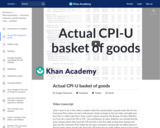
Exploring the actual weightings for the CPI-U basket of goods. Created by Sal Khan.
- Subject:
- Economics
- Social Science
- Material Type:
- Lesson
- Provider:
- Khan Academy
- Provider Set:
- Khan Academy
- Author:
- Sal Khan
- Date Added:
- 07/27/2021

Exploring the actual weightings for the CPI-U basket of goods. Created by Sal Khan.
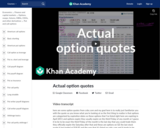
In this video we use some examples of actual option quotes to better understand options as a financial derivative. Created by Sal Khan.

The true tale of the Recycled Orchestra of Paraguay, an orchestra made up of children playing instruments built from recycled trash. The resources includes a lesson plan/book card, a design challenge, and copy of a design thinking journal that provide guidance on using the book to inspire students' curiosity for design thinking. Maker Challenge: Students will create their own musical instruments with recyclable materials.
A document is included in the resources folder that lists the complete standards-alignment for this book activity.

In this video we explore how to derive the demand for a factor of production based on how productive that factor is and how much additional revenue that factor brings in. Created by Sal Khan.

Explore the mechanics of adjustable rate mortgages (ARM) in this video, including how they work and in what situation an ARM might be advantageous and when it might work against you.

In this lesson, students will review Christopher Columbusâ" diligent actions as an adventurer and in completing the voyage across the Atlantic. They will achieve the following objectives.
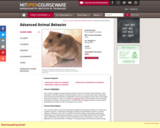
Reviews selected issues including learning, cognition, perception, foraging and feeding, migration and navigation, defense, and social activities including conflict, collaboration, courtship and reproduction, and communication. The interacting contributions of environment and heredity are examined and the approaches of psychology, ethology, and ecology to this area of study are treated. The relation of human behavior patterns to those of nonhuman animals is explored. Additional readings and a paper are required for graduate credit.

Advanced subject focusing on techniques, format, and prose style used in academic and professional life. Emphasis on writing as required in fields such as economics, political science, and architecture. Short assignments include: business letters, memos, and proposals that lead toward a written term project. Methods designed to deal with the special problems of those whose first language is not English. Successful completion satisfies Phase II of the Writing Requirement. This workshop is designed to help you write clearly, accurately and effectively in both an academic and a professional environment. In class, we analyze various forms of writing and address problems common to advanced speakers of English. We will often read one another's work.

As diseases become stronger in nature, currently available antibiotics are no longer strong enough to suppress and cure said diseases. Therefore, what factors contribute to diseases becoming resistant to drugs and what public policies should be developed around them? In this problem-based learning module, students will work with partners or in groups to first assess the increasing problem of drug-resistant diseases and the toll they are taking on the American public. Additionally, students will work to investigate what hospitals and lawmakers are doing to address this problem. Once students understand and are familiar with the current state of affairs, they will then work to further understand and research exactly why this issue needs to be brought to the attention of the general public, in order to promote change to current hospital procedures and policies. Further, students will determine the current political climate and support (or lack thereof) for policy, and will analyze the interest in keeping, changing or removing said policies altogether. Once the group has a full understanding, students will then work to determine their position on the issues surrounding antibiotic resistant diseases and the policies associated with these diseases. As soon as the group reaches a consensus, students will work to research and determine a professional way in which to present their goals and objectives for curbing the issue of drug-resistant diseases.
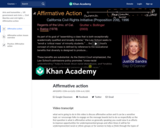
What affirmative action is in the United States and major legal cases and initiatives surrounding it. Coverage of Regents of the University of California v. Bakke, Grutter v. Bollinger, and Proposition 209 in California.

The purpose of this course is to examine the African American experience in the United States from 1863 to the present. Prominent themes include the end of the Civil War and the beginning of Reconstruction; African Americans' urbanization experiences; the development of the modern civil rights movement and its aftermath; and the thought and leadership of Booker T. Washington, Ida B. Wells-Barnett, W.E.B. Du Bois, Marcus Garvey, Martin Luther King Jr., and Malcolm X. WARNING: Some of the lectures in this course contain graphic content and/or adult language that some users may find disturbing.
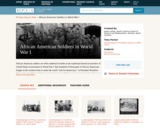
This collection uses primary sources to explore the experiences of African American Soldiers in World War I. Digital Public Library of America Primary Source Sets are designed to help students develop their critical thinking skills and draw diverse material from libraries, archives, and museums across the United States. Each set includes an overview, ten to fifteen primary sources, links to related resources, and a teaching guide. These sets were created and reviewed by the teachers on the DPLA's Education Advisory Committee.

As a historic unit of the National Park Service, the Mary McLeod Bethune Council House is listed in the National Register of Historic Places. The site also is within the boundaries of the Logan Circle Historic District. This lesson is based on the Historic Resources Study for Mary McLeod Bethune Council House National Historic Site, as well as other materials on Bethune and the National Council of Negro Women. The lesson was written by Brenda K. Olio, former Teaching with Historic Places historian, and edited by staff of the Teaching with Historic Places program and Mary McLeod Bethune Council House National Historic Site.

Constitutional amendments were ratified during and after the Civil War to protect the natural and civil rights of African Americans. Despite these legal protections, the condition of African Americans significantly worsened in the last few decades of the nineteenth century. In the late nineteenth century, the promise of emancipation and Reconstruction went largely unfulfilled and was even reversed in the lives of African Americans. Southern blacks suffered from horrific violence, political disfranchisement, economic discrimination, and legal segregation. Ironically, the new wave of racial discrimination that was introduced was part of an attempt to bring harmony between the races and order to American society.

We've learned about demand for a good or service, but aggregate demand is different: its the demand for everything bought in an economy. In this video, we discuss how aggregate demand (AD) is different from demand and why aggregate demand is downward sloping. Created by Sal Khan.

Students will explore global climatic datasets to analyze the factors that constrain and enable agricultural options.
GeoInquiries are designed to be fast and easy-to-use instructional resources that incorporate advanced web mapping technology. Each 15-minute activity in a collection is intended to be presented by the instructor from a single computer/projector classroom arrangement. No installation, fees, or logins are necessary to use these materials and software.

This inquiry focuses on Mesopotamia and represents just a slice of what students should learn about the development of agriculture and the establishment of human civilization, so additional inquiries may be needed to fully represent the key idea.

This primary source set includes documents and images from the life of Alexander Hamilton. A teacher guide is included to assist educators in utilizing the primary sources in their instruction.

In this lesson, students will study the life of Alexander Hamilton. Students will learn about his reasoning in supporting a single and powerful executive leader, his role at the Constitutional Convention, and the role he played in shaping the new United States government.

This resource is a Google Arts & Culture interactive presentation about Alexander Hamilton and the ratification of the United States Constitution.